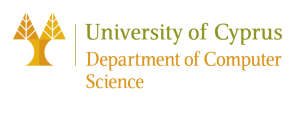- Teacher: George Papadopoulos
- Teacher assistant: Christoforos Panayiotou
- Teacher: Chris Christodoulou
- Teacher: Yannis Dimopoulos
- Teacher assistant: Christina Zavou
Σκοπός του μαθήματος είναι η εισαγωγή των φοιτητών στις δυνατότητες που παρέχουν οι τεχνολογίες πληροφορικής στην ιατρική και κλινική πρακτική, κυρίως μέσα από τη μοντελοποίησης της ιατρικής πράξης, των διαδικασιών και της γνώσης, από τους τρόπους διαχείρισης, προτυποποίησης, και παρουσίασης της πληροφορίας.
Επίσης, στοχεύει στο να εισάγει τον σπουδαστή στις πηγές των απαιτήσεων της υγείας όπως για παράδειγμα με τις εφαρμογές ηΥγείας, όχι μόνο σε επίπεδο των υπηρεσιών υγείας, αλλά και θέματα πρακτικής εφαρμογής τους. Επιπλέον, η εκπαιδευτική ενότητα θα προσφέρει την αναγκαία γνώση που αφορά στις έννοιες και στα δομικά στοιχεία που αποτελούν τα πληροφοριακά συστήματα της υγείας.
- Teacher: Costas Pattichis
- Teacher assistant: Marios Neophytou
